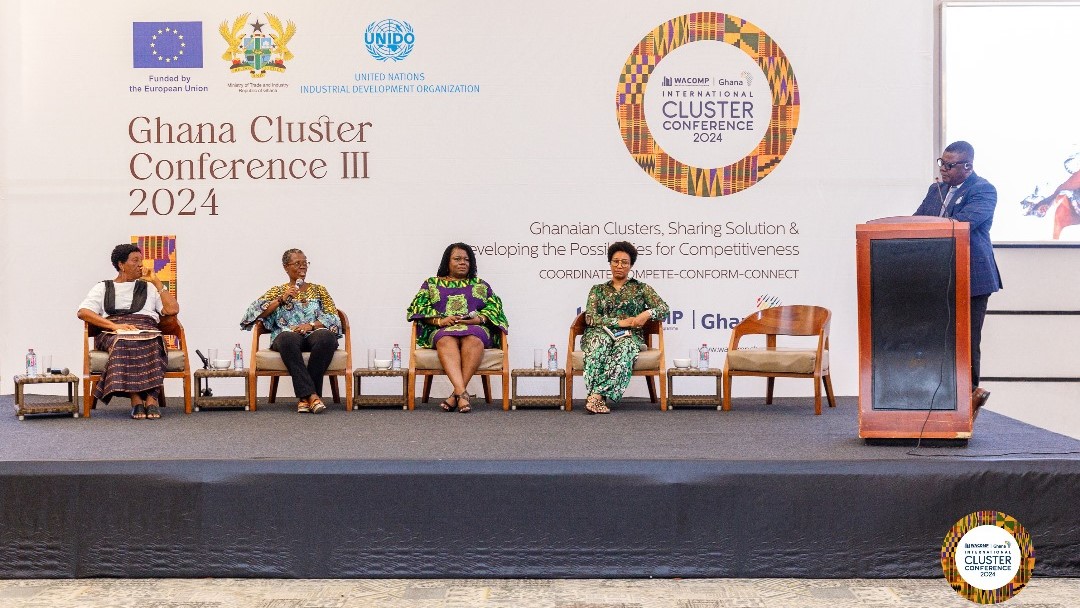Empowering Ghana’s Economic Potential through Cluster Development
18 June 2024

Accra, 12 June 2024 - The 3rd International Ghana Cluster Conference was held as part of the WACOMP Ghana project led by UNIDO in collaboration with the Ghanaian Ministry of Trade and Industry and funded by the European Union.
The event brought together Ghanaian cluster members, representatives from ministries and governmental institutions, sector associations, the African Union Commission, the African Business Council, and the African Regional Economic Communities (RECs). International cluster practitioners contributed to present successful best practices to the attending partners.
Discussions centred on how clusters can stimulate private sector competitiveness and gender equality, and reflecting on how Ghana’s clusters have thus far improved production, compliance with market requirements, market access and innovation.
Representatives from the Economic Community of West African States (ECOWAS) and from the AU Commission highlighted the private sector’s crucial role in promoting cluster development, emphasizing the need for collaborative efforts to unlock the continent’s potential for sustainable economic and industrial development in the continent.
“SMEs are the backbone of Ghana’s economy and clusters are a pivotal tool to ensure that SMEs become stronger and competitive, ensuring the development of viable businesses capable to access new markets and generate revenues and jobs for the local communities” declared Kofi Addo, Chief Commercial Officer and head of the Government's flagship One District One Factory (1D1F) initiative under the Ministry of Trade.
Ebe Muschialli, UNIDO project manager for WACOMP Ghana, stressed that “clusters provide a unique ecosystem where businesses can collaborate, share resources, and innovate together. They offer SMEs access to larger markets, new and greener technologies, and equip them with the capacity to be more resilient and to overcome challenges that SMEs could not overcome alone”.
The UNIDO cluster methodology is a proven strategic tool for fostering inclusive economic development and ensuring women’s economic empowerment and enhanced economic opportunities for women-owned and women-led SMEs.
The WACOMP-Ghana’s project has increased employment and entrepreneurship support, as clusters provide a supportive ecosystem for female entrepreneurs, offering access to networks, markets, and resources necessary for business growth. The cluster approach frequently includes training and skill development programs tailored to women. This can be seen for example in the shea butter clusters in the north of the country, or with linen producers with the local technical centers and academia and ensuring that better and safer processing tools are available at the cluster level.
Sandra Snowden, CEO of Hendy Farms, a leading firm in the Dodowa mango cluster emphasized: “In a male-dominated value chain, like the mango one, thanks to cluster development and effective collaboration at the local level, we strengthened collective efficiencies and cooperation at the cluster level. We developed and implemented a collective action plan focused on improving the quality of our mangos and supported men farmers to produce better fruits through Good Agricultural Practices. We then put in place a solar dryer facility and strengthen women’s capacities to process fruits, generating additional revenues for the cluster, benefiting to all”.
With more than 150 attendees, the conference provided a platform for knowledge sharing, networking, and collaboration, contributing to the growth of Ghanaian clusters and their impact on the region’s competitiveness.
Learn more about the WACOMP results and success stories here: https://wacompghana.org/stories/
And about the 3rd International Cluster Conference here: https://wacompghana.org/3rd-cluster-conference-2024/
Address further enquiries:
Ebe Muschialli,
UNIDO Industrial Development Expert